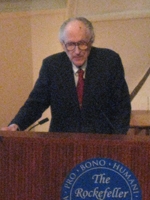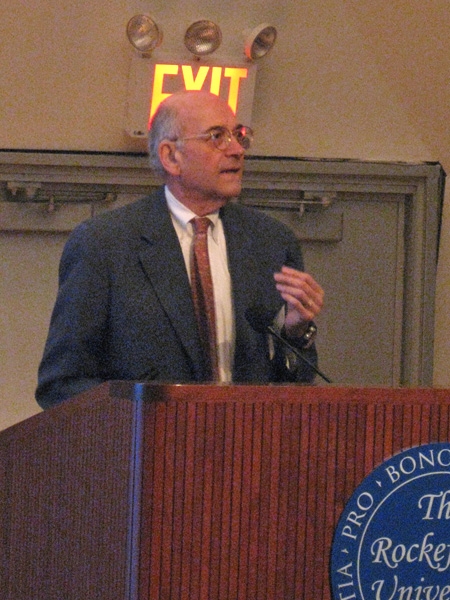Through "systematic, bureaucratic, state-sponsored persecution," the Nazi regime, during World War II, executed an estimated 6 million Jews, as well as hundreds of thousands of other people thought to be a threat to the German superpower.
In Darfur, Sudan, some experts estimate that as many as 450,000 people have been killed since war between the government and rebels broke out there in 2003.

Dr. David A. Hamburg discusses recent advances in preventing mass violence at the 89th Annual Meeting of the Association for Research in Nervous and Mental Disease, Dec. 16.
Dr. David A. Hamburg, one of the world's foremost authorities on mass atrocities, grew up in the shadow of the Holocaust. His grandfather fled the pogroms of Latvia in 1900 and devoted his life to bringing relatives who were subject to violent anti-Semitic behavior in Eastern Europe to America.
Dr. Hamburg has studied exhaustively global atrocities such as those in 1940s Germany, as well as modern day Darfur, Rwanda and the former Yugoslavia.
"I remember very clearly at the end of World War II, the world said, 'Never again, never again, never again.' But it's always again and again and again," Dr. Hamburg said.
Dr. Hamburg, the DeWitt Wallace Distinguished Scholar at Weill Cornell Medical College and president emeritus of the Carnegie Corporation of New York, and a former medical officer in the U.S. Army during the Korean War, has spent a lifetime trying to put "never again" into action.
Dr. Hamburg discussed the history and recent advances in stopping acts of mass casualties during his keynote address, "Preventing Mass Violence: Some Recent Advances," at the 89th Annual Meeting of the Association for Research in Nervous and Mental Disease.
The meeting, held Dec. 16 at the Rockefeller University, examined the psychological and neurological aspects of war from a variety of perspectives — from the experience of a Marine colonel during wartime to the exploration into the mind of a terrorist.
"In the context of ongoing military conflict and extremist violence in Iraq, Afghanistan and elsewhere, it is ever more important that we work to ameliorate the consequences of war as it affects the physical and mental health of combatants and non-combatants alike. At the same time, we endeavor to better understand and address some of the underlying motivations that perpetuate violence," said Dr. Jack Barchas, conference coordinator and chairman of the ARNMD Board of Trustees, the Barklie McKee Henry Professor and chairman of the Department of Psychiatry at Weill Cornell Medical College.
The actual concept of genocide prevention, Dr. Hamburg said, once seemed beyond human comprehension, let alone action. The argument against it was that the warning signs of a coming mass atrocity were both too subtle, and too swift, to trigger any kind of preventive response. Dr. Hamburg, however, disagrees.
"The warning signs in mass atrocities are never in days, weeks or months," he said. "They are always in years. But that information is often brushed aside, ignored, not put to good use."
Dr. Hamburg discussed what he calls the "pillars of prevention," in terms of stopping a potential genocide.
After preventive diplomacy — in which the United Nations, European Union, and large democracies like the United States must recognize the warning signals of a coming atrocity and immediately intervene — Dr. Hamburg said fostering indigenous democracy is the next logical step.
"But this cannot be at gunpoint, such as the case in Iraq," he warned.
Equitable socio-economic development is also a critical tool in genocide prevention. Countries such as those in Africa have the "curse of wealth," Dr. Hamburg said, where so much of the nation's wealth comes from one industry — namely, diamonds — and is concentrated in an extremely small fraction of the population.
Education in the fields of conflict prevention and resolution is an important — and grossly underutilized — factor as well, Dr. Hamburg says.
Finally, entities of international justice, such as the U.N., must intervene to stop human rights abuses, which often lay the groundwork for mass atrocities.

Conference coordinator and chairman of the ARNMD Board of Trustees Dr. Jack Barchas
"While this remains a horrible problem, it's important to remember that more horrible problems have been overcome," Dr. Hamburg said. "In my lifetime, I have seen the end of imperialism and colonialism; the end of fascist and communist totalitarianism; the end of apartheid in South Africa; and, for the most part, the end of slavery."
Conference organizer Dr. JoAnn Difede, associate professor of psychology in psychiatry and the director of Weill Cornell's Program for Anxiety and Traumatic Stress, also served as moderator for the opening discussion on post-traumatic stress syndrome. Dr. Difede, who has pioneered the use of virtual-reality technology as a treatment method for sufferers of PTSD, also spoke at the meeting on the possibilities of combining virtual-reality treatment with psychopharmacology.
"There no longer is any question about the psychological effects of combat on troops," Dr. Difede said. "We have experienced great success treating these symptoms with virtual reality. Our hope is that by combining these techniques with certain medications, the treatment would be even more effective."
Other speakers at the meeting included Dr. Nathaniel Laor, professor of child psychiatry and director of the Cohen-Harris Center for Trauma and Disaster Intervention, Tel Aviv; Dr. Jerrold M. Post, professor of political science at Georgetown University; and U.S. Marine Colonel Matthew Bogdanos, a homicide prosecutor in New York City, author of "Thieves of Baghdad," and recipient of the National Humanities Medal and the Bronze Star.
Photography by Joshua Hammann. --------

